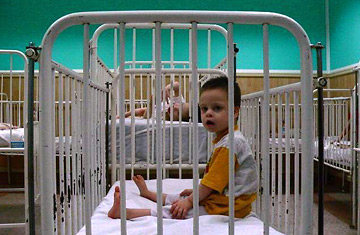
Rows and rows of neglected children alone in cribs at Kulina.
The Balkan wars may be over, put peace brought no relief for 16,000 mentally disabled children and adults in Serbia's orphanages and medical institutions, an international human rights group revealed on Wednesday. A study by the U.S.-based Mental Disability Rights International (MDRI) found that Serbia's treatment of its disabled citizens includes segregation, inhumane practices, and life-long detention in deplorable conditions. The group deemed the plight of Serbia's institutionalized disabled as torture, rather than treatment.
The study, a result of four years of research, focused on seven orphanages and two mental hospitals in Serbia. It underscores a long list of serious human rights abuses by citing concrete examples. "I looked at the crib and saw a child who looked to be seven or eight years old," a MDRI investigator said, recalling a visit to the so-called Special Institution for Children and Youth in the southeast Serbian village of Stamnica. "The nurse told me he was 21 and had been at the institution for eleven years ... He has never been taken out of the crib in eleven years."
At another home for disabled children in Kulina, investigators saw emaciated and dehydrated children; in a mental hospital in Kovin, they encountered patients with open sores who had been restrained and left unattended. In some institutions, disabled children were denied surgery because the doctors believed that they would die anyway, the report said. The institutions are understaffed and often lack basic facilities; many patients, both children and adults, are kept restrained for months, even years. Once committed, they are likely to remain in "special institutions" for life.
MDRI lauds Serbian authorities for their "enormous candor in admitting to poor treatment practices," and for adopting new laws and programs designed to remedy the situation. But the laws are rarely enforced and the programs suffer from chronic lack of funding.
The Serbian government was taken aback by the report, but did not try to contest the findings. "I am well aware of how horrible things are," Rasim Ljajic, the Serbian minister for labor and social policy, told TIME. "I couldn't sleep for three days after my first visit to Kulina."
His ministry has already decided to shut down some of the worst orphanages and place the children under more appropriate care, Ljajic said, but added that the problem is so huge that it would take years to contain it. "After decades of neglect, there are no swift solutions," he said.
As if to illustrate his point, Serbian social workers went on strike on Tuesday, a day before the report was revealed. They demand a 25% increase in their wages. The average wage is around $300 a month.
Meanwhile, attempts to renovate the mental hospital and geriatric center in Kovin, which houses more than 800 patients, have failed, and the 80-year-old buildings will have to be completely demolished and rebuilt from scratch, Serbian health authorities said. "This institution is beyond repair," said Milan Milic, the warden. "We'll have to figure out where to move the patients in the meantime. They'll just have to adapt."
